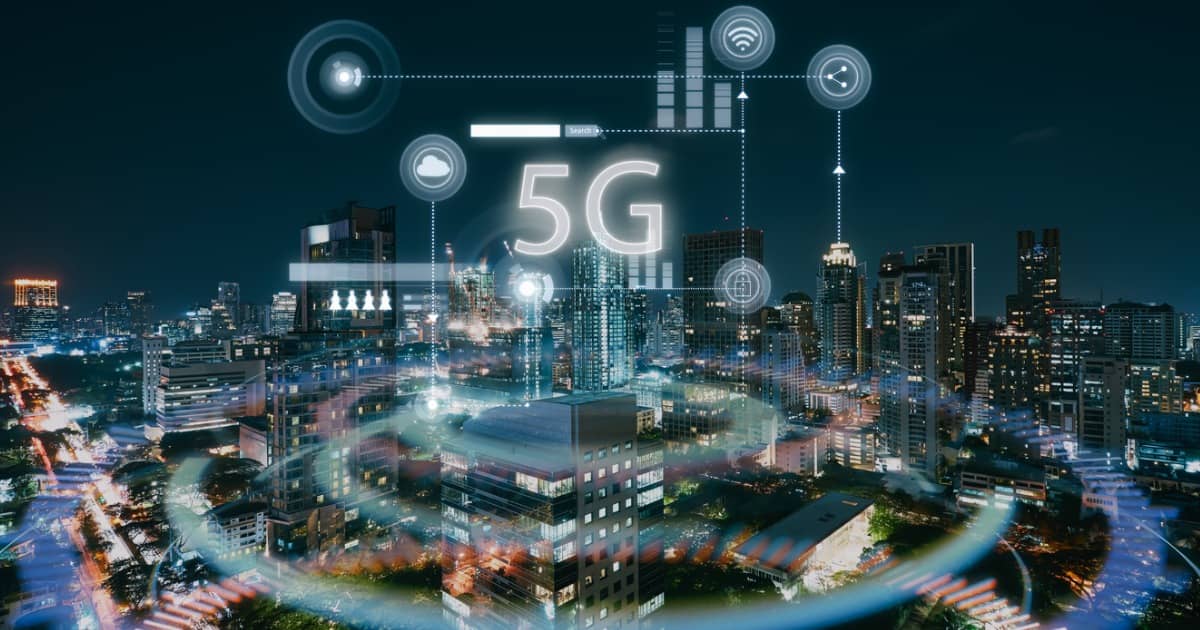How 5G will transform our cities into smart metropolises
Imagine a city where travel time is optimized thanks to smart traffic lights, where emergencies are handled with surgical precision, and where every service is connected to offer an unparalleled quality of life. These futuristic visions are about to become reality thanks to the 5G revolution. In this presentation, discover how this technology will transform our cities into true smart metropolises, where every moment is optimized and every service is just a click away.

5G as the backbone of smart cities
The digital revolution is underway, and with it, the advent of smart cities is taking shape thanks to the arrival of 5G. This technology is not limited to increasing connection speeds for end users; it is the very foundation upon which modern urban transformation rests. With real-time connectivity, 5G will enable unprecedented data management through its capacity to support a massive volume of simultaneous information exchange. This ultra-fast network will provide the intelligent infrastructure necessary for establishing the Internet of Things (IoT) in urban spaces.
Reduced latency, meaning minimal data transmission delay, is an undeniable technical advantage of 5G. According to telecommunications experts, this characteristic is fundamental for urban management systems to operate in a synchronized manner, enabling near-instantaneous responsiveness to the needs of the city and its inhabitants. Ultimately, 5G is poised to become the central pillar of tomorrow’s urban ecosystems, where every component will be interconnected to create a more responsive, efficient, and adaptive metropolis.
Transforming urban services through 5G
5G is poised to revolutionize modern urban planning through a series of unprecedented innovations. With this technology, optimized transportation becomes a tangible reality: from adaptive traffic lights to autonomous buses, every element of the transportation system can be interconnected for unparalleled fluidity and punctuality. Smart energy grids also promise to transform energy management in major cities through more efficient distribution and a significant reduction in waste.
The integration of 5G into municipal services translates into increased efficiency in urban maintenance and the delivery of public services. Moreover, during an emergency response, reaction time is a critical factor: 5G offers ultra-high-speed connectivity enabling instant communication between different emergency services, which can save lives. The term ” smart grid” takes on its full meaning in this context, symbolizing an urban fabric where every service is optimized and responsive to citizens’ needs.
Ultimately, 5G is not just a technological evolution; it represents the foundation upon which the smart cities of tomorrow will be built, making urban services more responsive, sustainable, and adapted to the challenges of increasing urbanization.
Environmental benefits of adopting 5G
The implementation of 5G in urban areas opens the door to a range of environmental benefits, including a significant contribution to urban sustainability. Through optimized energy management, this technology acts as a catalyst for transforming cities into “green cities.” Indeed, the adoption of 5G enables the integration of smart sensors into the energy distribution network, facilitating more precise allocation and therefore more efficient consumption of energy resources. The reduction of greenhouse gas emissions is another significant advantage, as improved management leads to lower overall energy consumption and, consequently, a reduced carbon footprint for metropolitan areas.
Improving the quality of life for city dwellers
With the advent of 5G, we are witnessing a revolution in how cities are designed and managed. This technology, thanks to its high bandwidth, offers city dwellers high-speed access that redefines the concepts of connectivity and connected living. Connected services become more efficient, transforming cities into true smart cities—intelligent metropolises where the quality of life is significantly improved. Intelligent traffic management, telemedicine, and instant access to a multitude of public and private services are just some of the benefits that 5G brings to city dwellers. A sociologist, an expert on the influence of technology in urban environments, could attest to the positive impact of this increased connectivity on social cohesion and the efficiency of urban infrastructure. Thus, 5G does not simply accelerate data transfer; it facilitates better integration of individuals into the urban fabric, improving access to opportunities and resource management in a constantly evolving living environment.
The security and privacy challenges of 5G
With the advent of 5G, concerns about data security and privacy are skyrocketing. The deployment of this technology in urban infrastructure implies a considerable increase in the volume and sensitivity of transmitted data, making cybersecurity an even more strategic area. Secure networks are becoming a major challenge for smart cities, which must guarantee both fast connectivity and user protection. Data encryption is proving to be an essential technique for maintaining the integrity and confidentiality of exchanged information. A cybersecurity expert would be ideally positioned to advise cities on best practices and technologies to adopt, to provide a secure and reliable environment for their residents.
Post Comment